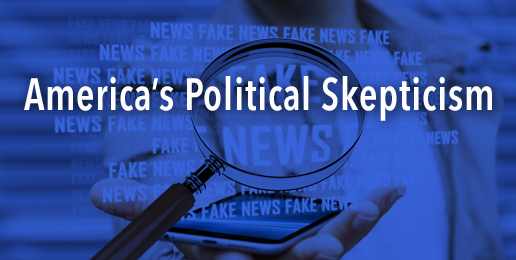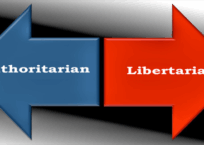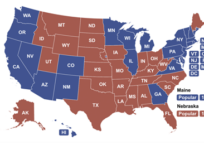
Gallup recently published some statistics about Americans’ trust in public institutions. The numbers aren’t pretty.
Less than half of Americans trust the legislative branch, the executive branch, the judicial branch, political candidates, the federal government’s handling of domestic or international problems, or the mass media. Specifically regarding the media, Americans’ trust has been declining over at least the last 20 years—if not the last 40.
We’ve now logged the third consecutive year when more Americans (36%) don’t trust the mass media, compared to those who do (31%). Before 2021, not a single year of Gallup results had more of the former category than the latter, but we’ve now landed three in a row.
On the one hand, I’m glad for this skepticism towards the media. It’s generally good to be skeptical of people who make their living reporting the news. This is because the more news they have, the more living they make.
Thus, the media often has a financial incentive to distort the news, because sensational stories sell more.
Yet, let’s face it: In today’s world, the media is about much more than just selling stories. It’s about ideology. The big media corporations have ideological incentives to distort the news to fit their agenda—and let’s be honest, it usually favors the liberal side of things. So, in that light, I’m extra glad for this skepticism towards the media. They deserve it!
On the other hand, though, it is sad. I believe that there is an honorable calling in every occupation, including journalism. Christians ought to be able to glorify the Lord in every (non-sinful) industry. Ideally, the media would indeed perform an honorable role in society—to give us information about the world which we cannot otherwise obtain ourselves. We can’t possibly go around investigating all current events by ourselves, so we need a trustworthy messenger to tell us all about it.
If people don’t think they can trust the media, the media becomes pretty useless to them. Thus, I look forward to the day, if the Lord grants me to see that day, when journalism becomes a respectable, and thus respected, industry again.
There’s one other aspect of this Gallup report that snags my attention. I find it fascinating that Democrats consistently trust every single institution in the list more than Republicans do—except for the judicial branch.
Now, a good bit of this is probably straight partisanship. Seriously, the “executive branch” has an 82% trust rating from Democrats and a 9% trust rating from Republicans. If you didn’t know anything else about the nation, could you guess which party has their guy in the White House right now?
Yet, after thinking about it for a little bit, I believe there may be a more fundamental reason why there’s such an imbalance in trust. Broadly speaking, Republicans tend to want less government in their lives, while Democrats tend to want more. So, it would make sense that Democrats would generally trust government more.
Republicans seem to have more (in my opinion) healthy suspicion of government. While obviously, all governments should merit trust from their people, every government should be handled with at least a little bit of suspicion. So perhaps Republicans’ mistrust of government isn’t entirely unreasonable.
With this in mind, however, what’s up with the judiciary? The trust ratios are flipped dramatically for this one institution. It’s not even close: 71% percent of Republicans trust the judiciary, while only 24% of Democrats do. Shouldn’t the judiciary—as apolitical as it is supposed to be—be the one institution that garners the most trust from both sides?
I’d speculate that so many Democrats don’t trust the judiciary because the judiciary has begun to stop playing the progressive game recently. Think back to the Supreme Court’s recent blows to abortion (2022) and affirmative action (2023), which were two mainstays of the progressives’ idea of empowerment.
The strong conservative majority on the Court—and decisions which it has been handing down—stand in noticeable contrast with the last several decades of American jurisprudence. For many decades now, we have been slowly shedding our traditional legal heritage in favor of more progressive ideals.
The case of Roe v. Wade (1973) is one excellent example—in this case, the Supreme Court manufactured a rationale that had no precedent in history or justification in constitutional law, all in order to justify mandating access to abortion.
Roe was a sharp break from historical and legal tradition, and part of the reason the Dobbs majority opinion was 108 pages long was because it was trying to set the record straight. Yet, because the Court has been playing versions of the progressive game for so long (think abortion, homosexuality, and transgenderism, and many others), it looks like they’re changing course when they start repealing wrong decisions which were themselves deviations from the way our legal system has always treated people.
Think about it this way: You’re on a road trip across Illinois, and at some point you decide to hop off the highway and start driving off-road for miles on end. To those who have gotten used to the exhilarating bumpiness, it will seem like a dramatic change in course when you suddenly decide to lurch back towards the road again.
But really what you’re doing is recovering what used to be—and what ought to be—normal.
I can see how it wouldn’t seem fair to progressive women that “their daughters will have fewer rights than their mothers” (that’s the catchphrase in response to Dobbs). Really, though, the Court was just refuting the pretension that there is a right where there never was one at all.
Ultimately, it’s more of an indictment on the Court’s previous decisions than its current ones.
Changing course to drive off-road is the deeper problem in the first place, and is the real reason you have to change course later on to get back on the road. But I can see why the statistics are playing out the way they are: It’s still pretty jarring to those who have never known anything but off-road driving.























